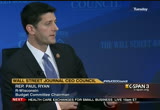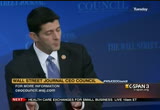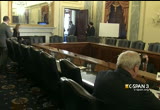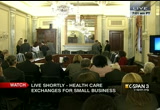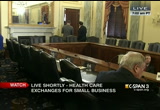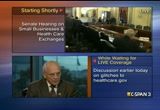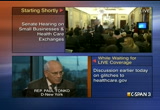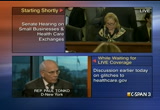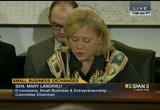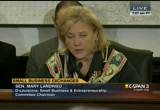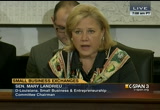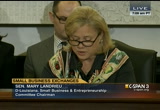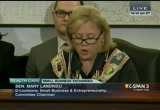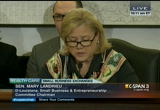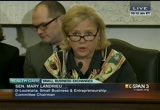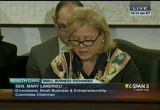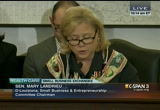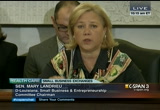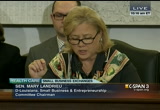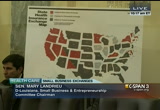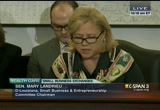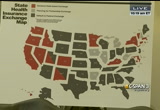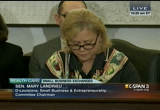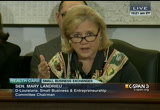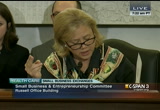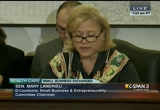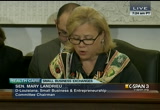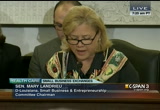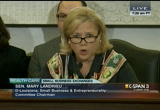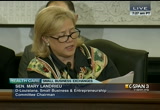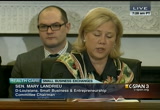tv Politics Public Policy Today CSPAN November 20, 2013 9:59am-10:30am EST
9:59 am
2010, had complete alternative patient-center reforms that we offered when obama care was being deliberated, so before, during, and after obama care, was deliberated and passed, we put out very comprehensive patient-centered market-based plans and i do envision us doing so again. to your other part of your question is, i believe that we can come up with a system that has guaranteed access for affordable health insurance for all americans, regardless of whether a person has preexisting conditions or not, without this costly government takeover, without this big brother database, without government running health care, without government mandating what you can and cannot do. the problem that the president has is he jammed this through one party rule, there are a plenty of republicans, myself included, who were offering to work with him at the time for bipartisan solutions, they said none of that, and now we have what we have. so, can we have a system where people with preexisting
10:00 am
conditions have protections? yes. can we have a system where we equalize tax benefits, where people who are low income, above medicaid, can get access to affordable health insurance? yes. and can we do that without this big government takeover, without the government forcing you to buy the insurance they want you to buy? yeah. i don't know that we'll get that with this president, but the republican party will clearly offer a better system that actually gets at the problem, the cost of health care. the health care inflation and access to affordable care, regardless of your health condition. we've offered those before, offering some right now, and we will offer some more in the near future. >> congressman ryan, thanks very much for joining us. >> thanks so much. thanks, paul. live here on capitol hill, where the senate small business committee is holding a hearing this morning on the health care exchanges for small businesses in states that opted to set up their own marketplaces.
10:01 am
the centers for medicaid and medicare will soon announce when small businesses can start enrolling online. for coverage through the small business health options program, also kno as s.h.o.p. coverage through the s.h.o.p. exchange is open to employers with fewer than 50 employees but is currently available only through paper applications. democrat louisiana senator mary landrieu chairs this committee, idaho senator james risch is the ranking republican on the committee.
10:03 am
again, we're waiting for the senate small business committee to begin a hearing this morning on the health care exchanges for small businesses in states that opted to set up their own insurance marketplaces. while we wait for the hearing to get under way, an update on the glitches on the healthcare.gov website. >> congressman paul tonko, democrat of new york, also on the subcommittee that held a hearing yesterday, looking into healthcare.gov. congressman, let me show you the headline in the "washington times," republicans press the president to remove the health website, they want it taken down. >> right. i think that every effort is being made to look through the weaknesses of the website and to
10:04 am
go forward and allow people the chance to enroll. it's improved. we've heard that. it's been made better and we'll continue to pursue so that hopefully in the next remaining days of the month, we'll see a vastly improved, better time response, fewer error situations and a site stability that i think will be helpful. >> you heard yesterday from henry kho, who is the guy at cms who oversaw the rollout of the website and he was saying yesterday at your hearing that 30% to 40% of this website is still not done. the accounting, that sort of stuff. an important part of the website. are you satisfied with that? >> i'm not satisfied. there's a lot of frustration and anger how this was rolled out, but the president has said himself he's angry about the way it's rolled out. there are those people who are
10:05 am
technically sound in terms of skill set who can get this finished, done, and improved, and i think that moving forward, you know, shooting for the exchange to be established, is a big benefit to americans and so many people, a great majority of people have indicated in recent polling they want it fixed. people now know what's in that package, they know what the vast improvements are, you know, the opportunity to have preventive care, the opportunity to avoid preexisting conditions as a bias, filling that do nut hole, not digging into the senior's pocket, 26-year-olds being able to stay on their parents' policy. all of these major benefits, the incentives for small business, the benefits there, where we had seen slippage over the last decade before we began this debate, the affordable care act. people have jumped into the
10:06 am
middle of the story and the website and its glitches, but no one is talking about what happened before the affordable care act. if we could take our seats and welcome to this important hearing this morning. the purpose of today's hearing is to explore the success stories of the rollout of the affordable care act in states throughout the country, where teamwork and cooperation has proven to be exceedingly effective. we will also hear from a federal panel that will talk about the federal rollout and some of the challenges that have presented themselves. normally, we have the federal panel first and the state panel second, but at the discretion of the chair, i reversed it, but require the federal leaders to be here to hear from the state exchanges and from individual business owners about how the situation could be improved. i'd like to begin by quoting, i think it was mark twain, who
10:07 am
said, "a lie can get halfway around the world before truth gets out of bed in the morning and puts its boots on." so this morning, we're going to try to give truth a chance. thank you for joining us for this hearing. the affordable care act passed, as we all know, on march -- in march of 2010 and was signed into law by the president three days later. that was over three and a half years ago. last year, the supreme court upheld one of the essential components of this law, the no free rider provision, requiring full participation through private and public health insurance marketplaces. the goals of the affordable care act at the time we passed the law were implemented for creating a workforce that was healthy, because only a healthy workforce can be a strong workforce, and america needs the strongest workforce we can get,
10:08 am
so we can continue to have the strongest economy in the world. those were the goals three and a half years ago. that is the hope and promise today. there were four specific goals of the affordable care act. one, to slow skyrocketing health care costs and reduce what america spends on health care as a share of our gdp. it was rising from 15% to 16.5% and headed very soon to 19%. that trend has been reversed. to use the power, not of the government, but of the private sector competition, the proven power of private sector competition, to rein in costs and improve quality care and coverage. to provide the first opportunity in the history of our country, whether union or nonunion, middle, high, or low-income wage earner, whether self employed,
10:09 am
small or large business, to excess affordable, quality health care. and, one of the most exciting and underappreciated features of the affordable care act, and one that this committee has focused a great deal of work, is that it provided for the first time a key to americans to unlock them from job lock, which prevents individuals in every state, including my own, from starting a new business because the risk associated with leaving full and good employment with full and good health care coverage causes them to stay sometimes in companies where they themselves might even do a better job starting their own, providing disruptive technology or good services. i'm proud to hand many of our entrepreneurs that key and intend to do so. according to the robert wood johnson foundation, nearly 1.5 million americans, including
10:10 am
25,000 louisianans will become self employed thanks to this bill, allowing them to fulfill their dream of becoming an entrepreneur, to pursue their dreams, to create the product or the system or service that they have dreamed about, and have health insurance, which was not possible before the affordable care act. fourth, to provide coverage to millions of low income and working class families that work 40, 50, and 60 hours a week, and worked for decades, and yet could not afford health care in the united states of america. the way that this bill has been crafted, they will, if the governors would expand medicaid to be able to choose their hospitals, doctors, and have health care. unfortunately, many of our governors are standing in the way. this is the hope and vision that we fought for. it is still worth fighting for now. the focus of today's hearing
10:11 am
will be specifically, though, on coverage options and access to our small businesses or businesses regardless of size. and i want to be clear, this is about the self employed, about the growing percentage of our population that call themselves contractors because of the way our economy is structured to be very flexible and independent. small businesses below 50 and small businesses above. now, we all know the rollout of the federal marketplace for individuals has not worked as well as we had hoped. we know there are many challenges, we will hear about those today. but thank goodness there are bright examples throughout the united states where the aca's vision is working, and we are going to hear from those states today. specifically, we're going to hear from representatives leading the implementation of the s.h.o.p. marketplaces now open at the state level to understand both the challenges
10:12 am
and the successes experienced by those states, who accepted the responsibility to build their own exchanges, who accepted the challenge of the federal government to say we can't always do things right, here, we'll give you the option to do it. some of our governors were brave enough to do so, others were not. usually, this committee hears from federal officials, as i said, but i've asked them specifically to be in the room, because they need to hear the best practices about what's going on around the country so they can get a better understanding of what we're trying to do. we will also be hearing from representatives, federal agencies, et cetera. now let me go into a few more things and the time that i take will be given equally to the minority. before we begin, i'd like to take a moment to put today's discussion into context. as we were debating the health reform act in 2009, and i was here and robustly engaged in that debate and helped to design the system that we have now, which was a compromise system
10:13 am
between a government-run single payer system and a medical savings account system with no floor or no safety net, we designed this. it was particularly for 96% of all businesses that employ fewer than 50 people, who were struggling to remain competitive and we were focused on helping them. small businesses were paying an average of 18% more than big business for health insurance that wasn't the same quality, and they saw their health care costs increase faster than the prices of the products and services they were selling. the record says four times faster than the rate of inflation between 2001 and '09, after the number of employees offering coverage remained relatively flat in the 1990s, average annual family premiums for workers at small businesses increased by 123%, from 5,700 in
10:14 am
1999 to 12,700 in 2009, so the rate of increase was going up substantially before the affordable care act, which is one of the reasons it was passed, to try to taper down those rates and get them lower. the percentage of small firms offering coverage started falling from 65% to 59%, and it was spiraling downward. it's no wonder that since 1986, one concern for every small business every year has been access to affordable care, and this is not from a liberal think tank, this is the finding of the national federation of independent business. they have testified before our committee on many occasions. this made reform, in my mind, imperati imperative, and the small business marketplace an important tool towards increasing choice and competition, reducing cost for
10:15 am
small business, and providing coverage to their employees that serve as the back bone of this american economy and a model for the world. a shop is an online marketplace where small businesses with 50 or fewer employees can purchase health insurance from their employees voluntarily, because under the affordable care act, they are not required, the businesses aren't required, the employees can. functioning s.h.o.p. marketplaces will give functioning business owners the tools they need to be smart consumers as they choose affordable options for their businesses without damaging their bottom line and leveling the playing field with large businesses to improved access to affordable health benefit options to their employees. many are like family. i cannot tell you how many small business owners have come up to me over the course of the last several years and said, senator, i would love to offer my people insurance, but i cannot find it anywhere, and because my best
10:16 am
friend who helped me start this business wife has cancer, we are now completely priced out. how am i going to keep my business, because i feel badly, because i don't want to ask him to leave. if he would leave, i could get employment -- i mean, insurance, for my businesses. that's a choice i don't think americans should be making, and i don't want anyone in louisiana to make that choice or have to make that choice. at the end of this month, small businesses with 50 or fewer full-time equivalent will be eligible but not required to purchase and provide insurance for their employees. pooling these eligible or e.t. small businesses and larger groups will spread risks, allowing insures to stop providing high premiums. the new s.h.o.p. marketplaces will allow small businesses to
10:17 am
compare plans easily, which was never hardly ever possible before, taking the administrative burden off employers and allowing them to get back to running their businesses, which they do best, not filing paperwork to get health insurance. it was a broken market, we intend to fix it. according to 2009, business round table report, the administrative cost to small businesses through the exchanges would be reduced by as much as 22%. i'd like my staff to put up what's happening around the state and i'd like people's eyes to focus what's happening in a good way and still challenging ways. this is the united states of america, you will recognize it. declared state-based exchanges are in red. planning for partnership exchanges are in the gray area, and those states that defaulted to the federal government, and i want to underscore this, because mine is one of them, states that
10:18 am
had a chance to set up an exchange for their small businesses that were given every opportunity and in the case of my state was also attached with a check for $16 billion to help make it work, was rejected by my governor and by many governors, and instead, they defaulted at their own choice, their own choice, not at president obama's choice, and then did nothing virtually to help. it's no wonder some of them aren't working, but today, we're going to have an opportunity to talk to those governors, both republicans and democrats that did step up and lead, did take what was offered to them and set up exchanges that would work for their small businesses. each state has the flexibility to decide how they want to operate their health insurance marketplaces. as you can see on this map,
10:19 am
there are four different categories that each of the 50 states and the district of columbia fit into. some states have federally facilitated exchanges, which means they are leaving it to the federal government, unfortunately, that would be mine. i wish i had been given that choice, but that was one mistake in the bill, leaving it up to governors, maybe not a mistake, but in some cases it was, it seems. other states are operating partnership exchanges where the federal government operates the marketplace in conjunction with the state. some states chose to do a partnership with the federal government, we'll see how that's working. another group of exchanges have split exchanges, where the federal government runs the individual marketplace and the state runs the s.h.o.p. marketplace. the final category is made up of states that run both, these states cover approximately 1/3 of the population of the united states. this is a big country.
10:20 am
and it goes way beyond the beltway of washington, d.c., and you're going to hear today about one-third of the population that it's either working really, really well or it's working to some degree and with some changes could work better, and a few places where they are having some serious challenges, but you're going to hear from people who are at least trying. kentucky and the district of columbia are included in this category, and we will be hearing from representatives of these exchanges during our first panel this morning. in total, there are 18 states, plus the district of columbia, running their own s.h.o.p. exchanges, and for the record, since this is so important, i want to put these states in the record, california, colorado, connecticut, the district of columbia, not a state yet, maybe one day, hawaii, idaho, kentucky, maryland, massachusetts, minnesota, nevada, new mexico, new york, oregon, rhode island, utah, vermont, and washington state. in all parts of our country, some with republican governors,
10:21 am
some with democratic governors, but all with people who need leadership to help them find health care that they can afford. and it makes up nearly 40% of all the nation's small employers are in these states. that's who we're focused on today. we all know that the rollout of the individual insurance website has been disappointing, to say the least, but today's hearing is focused on implementing the rollout of the s.h.o.p. exchanges, which is the focus of our committee, where we had a lot of input into how this bill was designed, to emphasize the need for a better rollout, not just for individuals, but for small businesses. today, as i said, we are joined by states that accepted this challenge and responsibility to create state-based exchanges and did it well, as well as those who are having difficulty. for those states that have made the decision to operate their own s.h.o.p. marketplaces, we're already seeing evidence. i'm not going to repeat everything that's in testimony, but i will say for kentucky, i
10:22 am
was completely happy to see and spoke to senator -- governor bashir, kentucky did what i thought we should do, and i have a bill to correct this, to use their licensed health agents to sell the policies, which is a brilliant idea. we did not do that. unfortunately. and so they hit the ground running because their agents were already licensed and understood the market well and were able to sell. we'll hear more about that. that's kentucky, and you'll hear more about kentucky. in d.c. between october 1 and 13, they had more than 84,000 visitors to their website. what i loved about the testimony from d.c., and we'll hear more about it, is that instead of the chamber of commerce dragging its feet, he says, the d.c. chamber of commerce, the greater washington area hispanic chamber, and the restaurant association partnered to build this exchange and put their
10:23 am
muscle and their brainpower behind it, and it's probably one of the most successful in the country. nearly 700 employer accounts have been created using their site, and finally in new mexico, and our senator is here, has seen similar successes, as well. they accepted the, you know, the leadership challenge, and to date, 1,143 small businesses with 3,192 employees have been registered, required information within the new mexico exchange. if they all fully enroll with the average number of dependents, that will be a potential total of 8,000 members, and it's just been opened for a very short period. we'll hear more about that. making the aca work the way it was intended is what i intend to try to do. there are others that have different goals. ensuring that these marketplaces work the way they were intended when we passed the act is vital to helping the businesses in our country and families that depend
10:24 am
on these businesses to get the help they need to stay healthy, and most importantly, for me as a mother, not just to stay healthy physically, but to be mentally free of the worry that any day your business is one day away from bankruptcy or your family is one accident away from bankruptcy. there's no price that you can put, in my view, on peace of mind. i don't know any economist in the world that could price it, but i can tell you as a mother, it's very costly. the s.h.o.p. marketplaces need to work so that small business owners can easily and efficiently compare the different plans that are available for themselves, which they were never able to do, and the employees can pick the plan that makes the most sense. now opponents of the law, and there are many, are fixated, fixated, on the problems of the law as opposed to the promise that it holds. i believe this is wrong. these problems, while challenging, are fixable. we've fixed many things in the
10:25 am
united states, big things, bold things, and great things. this is something we can fix. and regardless of how we voted for the aca, whether we liked it or not, it is the law of the land and in my view, it deserves to be fixed, not repealed. we have the responsibility to make the affordable care act work, not because of politics, but because of the people, and this is not about president obama, it's about the people of the united states of america. it's about the millions of small business owners who want desperately to provide quality affordable health care to their employees, who have dreamed about building a business, who love the people that they work with, and they were never able to find something that they could afford or count on. if they did, they had to compromise below their standards, because i know americans pretty well, and they are very generous people. and it's about people like kiwi armstrong from baton rouge, an independent construction worker, he works on big projects on oil
10:26 am
and gas onshore and off. because of the nature of his employment, he works on several projects throughout the course of the year and is not a member of the labor union. in 2012, he got nine different w2s, but the shifting nature of his employment means he can't get coverage through his employments. when he tried to get blue cross/blue shield, they denied him because of type 2 diabetes. because of the affordable care act, he can get coverage on the health insurance marketplace and give him flexibility to work any project he wants without worrying about whether it will provide coverage or not. this is why we're having this hearing today, we're having this hearing to make sure we're doing everything possible to make sure this act works for small business owners and their employees. my goal for this hearing is it will not be an occasion for grandstanding, but an opportunity to focus on the work before us, which is fixing what is broken and to do that, we have to be honest with each
10:27 am
other and open to hear testimony about what's working, what's not working, and when we find something that's not working, how can it be fixed? some of our witnesses today are also small business owners that have yet to realize the benefit that their colleagues and states where these exchanges are working. some of these businesses are in states where the governor's said no, we're sorry, we don't want to help you. i'm sorry you all are in those states, but that's the situation. i'm going to add one thing to the record, there was a study that came out yesterday that i want to put in the record, the tax study, will somebody please hand it to me? i have it here. all right. this study came out this week, the supreme court's aca decision and its hidden surprise for employers. this is about medicaid expansion, and the key finding is, states that do not expand medicaid leave employers exposed to higher shared responsibility
10:28 am
payments under the affordable care act. the associated cost to employers could total $876 million to $1.3 billion each year in the 22 states that have opposed. or leaning against or remain undecided. by way of example, the decision in texas to forego medicaid expansion may increase federal tax penalties on texas employers by $299 to $448. now, this is from a completely nonpartisan jackson-hewitt, i think they prepare tax returns. i don't think they are a stakeholder group to anyone, so because of the decision that governor perry made, his decision, not president obama's, is going to cost his businesses more. now i'm going to turn this over to senator risch, he can have as much time as i did, which i think was probably about 20
10:29 am
minutes, 25 minutes, and then we will go to your statements will be submitted to the record and then we're going to go directly to our testimony. i thank all of my colleagues for coming this morning. >> well, thank you very much, madam chairman, and first of all, i commend you for holding this hearing, probably not for the reasons you think, but certainly, there have -- when you throw hundreds of billions of dollars against the wall, something is going to stick. and to try to use the handful of things that actually have worked in this 3,000 pages of legislation, and nobody knows how many pages of regulations and say okay, well, it's working because this small part is, really is to ignore the overall problem. again, i commend you for your courage in holding this, and more importantly, madam chairman, i commend you for your statement that you helped to de
78 Views
IN COLLECTIONS
CSPAN3 Television Archive
Television Archive  Television Archive News Search Service
Television Archive News Search Service 
Uploaded by TV Archive on

 Live Music Archive
Live Music Archive Librivox Free Audio
Librivox Free Audio Metropolitan Museum
Metropolitan Museum Cleveland Museum of Art
Cleveland Museum of Art Internet Arcade
Internet Arcade Console Living Room
Console Living Room Books to Borrow
Books to Borrow Open Library
Open Library TV News
TV News Understanding 9/11
Understanding 9/11